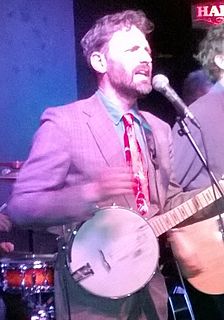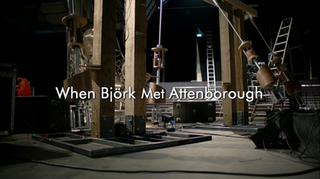Related Research Articles

Sir David Frederick Attenborough OM GCMG CH CVO CBE is an English broadcaster, natural historian and author. He is best known for writing and presenting, in conjunction with the BBC Natural History Unit, the nine natural history documentary series forming the Life collection, a comprehensive survey of animal and plant life on Earth.

The Blue Planet is a British nature documentary series created and produced by the BBC. It premiered on 12 September 2001 in the United Kingdom. It is narrated by David Attenborough.

Life in Cold Blood is a BBC nature documentary series written and presented by David Attenborough, first broadcast in the United Kingdom from 4 February 2008 on BBC One.

A nature documentary or wildlife documentary is a genre of documentary film or series about animals, plants, or other non-human living creatures, usually concentrating on video taken in their natural habitat but also often including footage of trained and captive animals. Sometimes they are about wildlife or ecosystems in relationship to human beings. Such programmes are most frequently made for television, particularly for public broadcasting channels, but some are also made for the cinema medium. The proliferation of this genre occurred almost simultaneously alongside the production of similar television series.

Planet Earth is a 2006 British television series produced by the BBC Natural History Unit. Five years in the making, it was the most expensive nature documentary series ever commissioned by the BBC and also the first to be filmed in high definition. The series received multiple awards, including four Emmy Awards, a Peabody Award, and an award from the Royal Television Society.

Frozen Planet is a 2011 British nature documentary series, co-produced by the BBC and The Open University. It was filmed by the BBC Natural History Unit. The production team, which includes executive producer Alastair Fothergill and series producer Vanessa Berlowitz, were previously responsible for the award-winning series The Blue Planet (2001) and Planet Earth (2006), and Frozen Planet is billed as a sequel of sorts. David Attenborough returns as narrator. It is distributed under licence by the BBC in other countries, Discovery Channel for North America, ZDF for Germany, Antena 3 for Spain and Skai TV for Greece.

Life is a British nature documentary series created and produced by the BBC in association with The Open University. It was first broadcast as part of the BBC's Darwin Season on BBC One and BBC HD from October to December 2009. The series takes a global view of the specialised strategies and extreme behaviour that living things have developed in order to survive; what Charles Darwin termed "the struggle for existence". Four years in the making, the series was shot entirely in high definition.

Robert Timothy Dowling is an American journalist and author who writes a weekly column in The Guardian about his life with his family in London.
The following is a chronological list of television series and individual programmes where Sir David Attenborough is credited as writer, presenter, narrator or producer. In a career spanning eight decades, Attenborough's name has become synonymous with the natural history programmes produced by the BBC Natural History Unit.

Charles Darwin and the Tree of Life is a 2009 television documentary about Charles Darwin and his revolutionary theory of evolution through natural selection, produced by the BBC to mark the bicentenary of Darwin's birth. It is part of the BBC Darwin Season. The presenter, David Attenborough, outlines the development of the theory by Darwin through his observations of animals and plants in nature and in the domesticated state, visiting sites important in Darwin's own life, including Down House, Cambridge University and the Natural History Museum, and using archive footage from Attenborough's many nature documentaries for the BBC. He reviews the development of the theory since its beginnings, and its revolutionary impact on the way in which humans view themselves - not as having dominion over the animals as The Bible says, but as part of the natural world and subject to the same controlling forces that govern all life on Earth.

The Virtual Revolution was a British television documentary series and interactive web experience presented by Aleks Krotoski, which began airing on BBC Two on 30 January 2010. A co-production between the BBC and the Open University, the series looks at the impact the World Wide Web has had since its inception 20 years ago. The series took a different approach to BBC documentary making by encouraging an open and collaborative production.

Richard Samuel Attenborough, Baron Attenborough was an English actor, filmmaker, and entrepreneur. He was the president of the Royal Academy of Dramatic Art (RADA) and the British Academy of Film and Television Arts (BAFTA), as well as the life president of Chelsea FC. He joined the Royal Air Force during the Second World War and served in the film unit, going on several bombing raids over Europe and filming the action from the rear gunner's position. He was the older brother of broadcaster Sir David Attenborough and motor executive John Attenborough. He was married to actress Sheila Sim from 1945 until his death.

Mike Gunton is a British television producer and a senior executive at the BBC Natural History Unit, the world's largest production unit dedicated to wildlife film-making. In November 2009 he became the Unit's first Creative Director.
First Life is a 2010 British nature documentary series written and presented by David Attenborough, also known by the expanded titles David Attenborough's First Life (UK) and First Life with David Attenborough (USA). It was first broadcast in the US as a two-hour special on the Discovery Channel on 24 October 2010. In the United Kingdom it was broadcast as a two-part series on BBC Two on 5 November 2010. First Life sees Attenborough tackle the subject of the origin of life on Earth. He investigates the evidence from the earliest fossils, which suggest that complex animals first appeared in the oceans around 540 million years ago, an event known as the Cambrian Explosion. Trace fossils of multicellular organisms from an even earlier period, the Ediacaran biota, are also examined. Attenborough travels to Canada, Morocco and Australia, using some of the latest fossil discoveries and their nearest equivalents amongst living species to reveal what life may have been like at that time. Visual effects and computer animation are used to reconstruct and animate the extinct life forms. Attenborough's Journey, a documentary film profiling the presenter as he journeyed around the globe filming First Life, was shown on BBC Two on 24 October 2010. A hardback book to accompany the series, authored by Matt Kaplan with a foreword by Attenborough, was published in September 2010.
Attenborough and the Giant Egg is a 2011 British nature documentary written and presented by David Attenborough. The documentary is a follow-up of an episode in Madagascar, filmed in 1960, for Attenborough's earliest nature documentary series, Zoo Quest. In that episode, a native boy gave Attenborough a collection of large pieces of eggshell, which Attenborough temporarily pieced together with sticky tape to form a complete eggshell of the extinct elephant bird. The egg is the subject of the 2011 documentary, which is an hour long and premiered on 2 March 2011.
Attenborough: 60 Years in the Wild is a three-part BBC documentary series chronicling the 60 years career making wildlife programmes of Sir David Attenborough. The first hour-long programme, titled "Life on Camera" was broadcast on Friday 16 November 2012 on BBC Two at 9pm. The second part, "Understanding the Natural World" and third and final part, "Our Fragile Planet" were broadcast on following Fridays, 23 and 30 November 2012.

When Björk Met Attenborough is a 2013 documentary television film directed by Louise Hooper, executive produced by Lucas Ochoa and produced by Caroline Page. It was aired for the first time on 27 July 2013 on Channel 4, in conjunction with Pulse Films and One Little Indian Records. Partly filmed at the Natural History Museum in London, the documentary features an encounter between Icelandic singer-songwriter and musician Björk and English broadcaster and naturalist David Attenborough. They discuss the nature of music and the intersection between music, nature and technology. It also follows the singer as she prepares for her Biophilia Tour, along with rehearsal and studio recording.
Triumph of the Vertebrates is a 2013 British documentary film by David Attenborough. It is about the evolution of vertebrates. The first part is From the Seas to the Skies, while the second part is Dawn of the Mammals.

Planet Earth II is a 2016 British nature documentary series produced by the BBC as a sequel to Planet Earth, which was broadcast in 2006. The series is presented and narrated by Sir David Attenborough with the main theme music composed by Hans Zimmer.

David Attenborough: A Life on Our Planet is a 2020 British documentary film narrated by David Attenborough and produced and directed by Jonnie Hughes. The film acts as a "witness statement", through which Attenborough shares first-hand his concern for the current state of the planet due to humanity's impact on nature and his hopes for the future. It was released on Netflix on 4 October 2020, along with a companion book A Life on Our Planet.
References
- ↑ "Attenborough's Journey". BBC Two. Retrieved 30 July 2012.
- ↑ Dowling, Tim (24 October 2010). "TV review: Attenborough's Journey and DOA". The Guardian. Retrieved 30 July 2012.